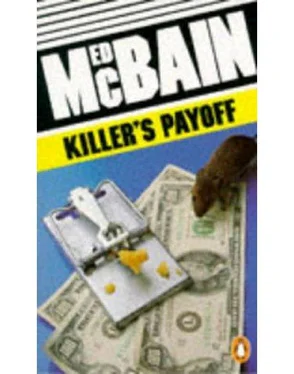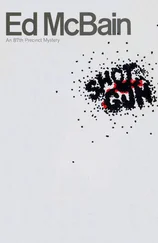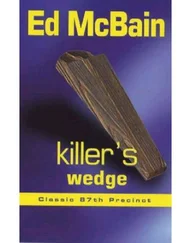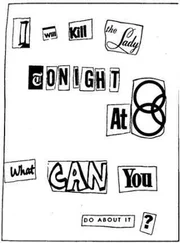McBain, Ed - Killer's Payoff
Здесь есть возможность читать онлайн «McBain, Ed - Killer's Payoff» весь текст электронной книги совершенно бесплатно (целиком полную версию без сокращений). В некоторых случаях можно слушать аудио, скачать через торрент в формате fb2 и присутствует краткое содержание. Жанр: Полицейский детектив, на английском языке. Описание произведения, (предисловие) а так же отзывы посетителей доступны на портале библиотеки ЛибКат.
- Название:Killer's Payoff
- Автор:
- Жанр:
- Год:неизвестен
- ISBN:нет данных
- Рейтинг книги:5 / 5. Голосов: 1
-
Избранное:Добавить в избранное
- Отзывы:
-
Ваша оценка:
- 100
- 1
- 2
- 3
- 4
- 5
Killer's Payoff: краткое содержание, описание и аннотация
Предлагаем к чтению аннотацию, описание, краткое содержание или предисловие (зависит от того, что написал сам автор книги «Killer's Payoff»). Если вы не нашли необходимую информацию о книге — напишите в комментариях, мы постараемся отыскать её.
Killer's Payoff — читать онлайн бесплатно полную книгу (весь текст) целиком
Ниже представлен текст книги, разбитый по страницам. Система сохранения места последней прочитанной страницы, позволяет с удобством читать онлайн бесплатно книгу «Killer's Payoff», без необходимости каждый раз заново искать на чём Вы остановились. Поставьте закладку, и сможете в любой момент перейти на страницу, на которой закончили чтение.
Интервал:
Закладка:
Killer’s Payoff
Ed McBain
Introduction
Are we there yet?
Apparently not.
Ever the slave to the whims of cruel and unusual publishers, I am reluctantly continuing this seemingly incessant string of introductions, each of which is threatening to become as long as the 87th Precinct series itself. How is a mere writer supposed to remember the details of how a novel took shape in the year 1957, when Killer’s Payoff was being written?
I had my instructions.
That much I remember clearly.
Phase out Steve Carella. Carella is not a hero, he is a married man. Instead, give us a handsome hero with whom men can identify and with whom women can fall in love.
This is what I’d been told by the Pocket Books executive whom I prefer calling Ralph lest he turn his goons on me yet another time. Following the gentle persuasion that took place in the offices at 630 Fifth Avenue, I introduced the handsome new hero, Cotton Hawes, in a book titled Killer’s Choice. His debut caused no noticeable critical or popular acclaim. This did not lessen Ralph’s conviction that the series needed the shot-in-the-arm only a character of Hawes’s size and dimension could provide. In fact, and toward that end, Ralph had already concocted a slew of titles with the name “Cotton” in them, hoping to ensnare unsuspecting readers through the use of so-called Instant Newsstand Recognition.
You must remember that none of these books had as yet been published in hardcover. They were all paperback originals, and they sold for a mere twenty-five cents each—about a third of what a hit off a crack pipe will cost you at the time of this writing. In fact, if crack had been around back then, I’m sure Ralph would have suggested Cotton and Crack as one of the new titles in the new approach. As it was, he’d come up instead with such scintillating gems as Cotton and Steel, Cotton and Silk, Cotton and Smoke, and Cotton and God Knows What Else.
Back then, titles were routinely changed by publishers as a matter of course, with little regard for the author’s feelings or the intent of the book. I fought for Killer’s Payoff (which in itself wasn’t such a terrific title) because I’d already written Killer’s Choice, introducing Hawes, and I felt the next novel should echo it somewhat. Besides, I tend to think in terms of three—perhaps because Conan Doyle wrote The Sign of the Four, or perhaps, gee, just maybe because the first Pocket Books contract was for three books, and the second was for another three. Killer’s Payoff was to be the last book in that second contract. After that, Pocket could renew again or not, as they saw fit. I had the feeling that if Hawes didn’t work out as the driving force behind the series, it was goodbye, Charlie.
Upon reflection, it’s interesting to note that the first four books in the series were titled after the sort of criminals a policeman might actually encounter: Cop Hater, The Mugger, The Pusher, and The Con Man. But with the introduction of Cotton Hawes, the titles became sort of…well, private-eye sounding, don’t you think? Killer’s Choice? And then Killer’s Payoff? And I already had the third Killer’s title in mind, which eventually became the book Killer’s Wedge. None of these were as dreadful as the Cotton and titles conjured by Ralph, but they nonetheless had a pulpy, private-eye sound to them, perhaps, gee, just maybe because they were introducing a pulpy, somewhat private-eye character. Let’s face it. Badge or not, Cotton Hawes acted like a private eye!
Well, I hadn’t hired on to do a private-eye series. The series I’d proposed—to reiterate for those of you who haven’t been religiously collecting these remarkable introductions—was to be a realistic look at a squad room of cops who, when put together, would form a conglomerate hero in a mythical city. This meant cops of any stripe or persuasion could come and go, kill and be killed, transfer out or transfer in, without hurting or diluting the overall concept. Ralph seemed to have forgotten the concept (though an innovative television “creator” remembered it only too clearly many years later). Back in 1957, however, I myself seemed in imminent danger of seriously compromising my own vision.
You have to understand that I still considered the Evan Hunter career my main career, even though the novel I’d published under my own name in 1956, the year Cop Hater was published, turned out to be what we call in the trade “a critical failure.” That is to say, all the reviewers loved Second Ending but we sold only two copies of it, one to my mother and the other to my beloved Aunt Fanny. By the time I sat down to write Killer’s Payoff, though, I’d already completed another Evan Hunter novel titled Strangers When We Meet, which sold to the movies before the ink was dry on it (we used to write with feather quills back then) and which went on to become an even bigger bestseller than The Blackboard Jungle, my previously filmed novel. What I’m saying is that I didn’t have to write these 87th Precinct novels, my livelihood did not depend upon them. But I was enjoying doing them and besides I had the feeling they could turn out to be pretty good stuff if I just didn’t listen too hard to anything Ralph had to say.
I decided that I’d give Hawes three books altogether. Killer’s Choice, already published. Killer’s Payoff, which I was starting to write. And Killer’s Wedge, for which I already had the title, but not an idea in my head. If he didn’t become the hero by then, he could be transferred out of the Eight-Seven as easily as he’d been transferred in. (There was still no contract for a third Hawes novel, by the way, but that might prove to be academic.) Meanwhile, I had this novel to write, and my work was cut out for me. All I had to do was move Cotton Hawes deeper into the spotlight at the center of the stage, simultaneously make certain he behaved at least somewhat like a cop, and resist every effort to turn him into a goddamn private eye.
And so to bed.
ED MCBAIN Norwalk, Connecticut July 1993
1.
IT COULD HAVE been 1937.
It might have looked like this on a night in late June, the sidewalks washed with a light drizzle, the asphalt glistening slickly, blackly, in the splash of red and green neons. Despite the drizzle, there would be a balmy touch to the air, the fragrant smell of June, the delicate aroma of bursting greenery. And the perfume of growing things would mingle with the perfume of passing women, mingle with the perfume of people and machines, mingle with the ever-present smell of the city at night.
The clothes would have looked different, the women’s skirts a little shorter, the men’s coats sporting small black-velvet collars, perhaps. The automobiles would have been square and black. The shop windows would have carried the blue eagle of the National Recovery Act. There would have been small differences, but a city does not really change much over the years, because a city is only a collection of people and people are timeless. And the way the automobile came around the corner, it could have been 1937.
The man walking on the sidewalk didn’t even look up when the sedan squealed around the corner. He was city-born and city-bred, and the sound of shrieking tires was not an alien sound to him. He walked with nonchalant arrogance, this man, dressed in expensive good taste. He walked with the sure knowledge that all was right with the world, the certainty that he was master of all he surveyed. The automobile squealed around the corner and headed directly for the curb. It pulled up about ten feet ahead of the walking man. The windows on the side facing the curb were open. The engine idled.
The muzzle of a rifle appeared at one of the windows. The man walking broke his stride for just an instant. The person about to fire the rifle was looking through a telescopic sight down the length of the barrel. The distance between the muzzle’s end and the walking man was no more than eight feet. There was a sudden blurring flash of yellow, and then a shockingly loud explosion. The man’s face erupted in flying fragments; the rifle was pulled back from the window. There was a moment, and then the car gunned away from the curb, tires burning rubber, shrieking into the night. The man on the sidewalk lay bleeding profusely, and the drizzle softly covered him like a shroud.
Читать дальшеИнтервал:
Закладка:
Похожие книги на «Killer's Payoff»
Представляем Вашему вниманию похожие книги на «Killer's Payoff» списком для выбора. Мы отобрали схожую по названию и смыслу литературу в надежде предоставить читателям больше вариантов отыскать новые, интересные, ещё непрочитанные произведения.
Обсуждение, отзывы о книге «Killer's Payoff» и просто собственные мнения читателей. Оставьте ваши комментарии, напишите, что Вы думаете о произведении, его смысле или главных героях. Укажите что конкретно понравилось, а что нет, и почему Вы так считаете.












